The rapid and sudden shift to remote work introduced a new way to operate that will likely persist long after offices reopen. While managing remote workers is complex, building the right team is a foundational piece of making remote work successful.
That means considering not just the talent you need now, but also the skills your business may need as it grows. Hard skills, like mastery of a foreign language or proficiency with cloud-based tools, are important. However, as the distance between your customer and team increases, other skills like digital communication, having a product manager mentality, and setting and working toward goals independently are especially needed.
Since NinjaRMM went fully remote, we’ve increased our headcount in every single department to grow our workforce. Finding the right candidate hasn’t always been easy, but one thing we’ve learned along the way is that gamers tend to be excellent remote workers. Indeed, gamers are increasingly a sought after group for employers, with even the U.K. Royal Air Force recruiting gamers because of their digital skills.
Here are just some of the valuable skills gamers can bring into your organization.
Digital Communication Prowess
Gamers have been masters of communication platforms since the early days of the internet, finding each other on online forums like Reddit and, more recently, in private on Discord or Slack. Jumping between applications, styles of communication, and audiences is a skill modern workforces need to have, especially with more customer interactions occurring on social media.
But digital communication skills don’t only apply to potential customers. Anyone that plays team-based games knows the feeling of matching with a fantastic teammate that pings enemy locations, points out resources, or helps strategize to support the team to victory. The same attributes of great communication as part of an in-game team translate to better communication from business units across departments.
Creative Problem-Solving
From puzzle games and platformers to role-playing and resource management games, give a gamer enough time and they will solve the problem in front of them. The ability to approach problems from different angles and employ new tools to get the job done is a critical trait that business leaders should be looking for as they shift their strategies to reach new customers.
A core part of being a problem-solver is having a product manager mentality. This means that, when presented with a problem, an employee can assess the landscape and start testing possible solutions or enhancements. The emphasis is on solving the problem and either using existing tools in new ways or developing the tools needed to do it. This skill can help not only solve problems quickly, but it may also help a team identify product or UX challenges that can improve the entire experience of the platform.
The complexity of some games can also be a powerful signal about a candidate’s ability to solve problems creatively. Famously, one EVE Online player turned their in-game experience of running a space-faring asteroid mining company into a real-life business. Whenever I meet a gamer in the interview process, I’m always sure to ask what kind of games they play as that may indicate certain ways they may tackle a problem and create value for the organization.
Shared Growth Mindset
In a remote work world, leaders need to trust that employees can set goals and work independently toward reaching those goals. For gamers used to grinding for experience to reach the next level, this is a natural process that showcases an ability to think in both short- and long-term timelines as they chart a course to their desired outcome.
But while setting and reaching goals independently is important, what’s even more valuable is finding someone that understands how their work contributes to the success of the team. Team-based games like League of Legends and Overwatch teach players how to strategize on the fly, adjust tactics to new scenarios, and understand the value one player’s actions can have in turning the tide of a game.
These skills directly translate to the office because it turns growth into a team sport. When business leaders can capture the natural skills and abilities of gamers, they can spend more time focused on the development of the business and less time micromanaging employees.
Build Bonds and Culture Through Gaming
I’ve seen firsthand the impact a culture of gaming can have inside an organization. For us, gaming comes from the very top and extends all the way down. Our company leaders are all gamers at heart and regularly play with staff — in fact, I landed my current role after getting to know our CEO through a mutual love of tabletop games.
As head of Europe, Middle East, and Africa (EMEA) operations, gaming is also something I look for as a way to build camaraderie across teams. Pre-COVID, I regularly hosted board game nights where employees could get to know each other in casual environments and explore mutual interests. The benefits of facilitating these kinds of interpersonal connections through games can’t be understated. A 2019 study by researchers at Brigham Young University found that teams that game together can see up to a 20 percent increase in productivity.
As a strategy for building effective remote teams, businesses should look to gamers as the next members of their team. Gamers understand natively how to collaborate and communicate in digital spaces and bring cultural benefits to the organization that results in greater outcomes to the company’s people and future growth.





